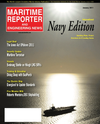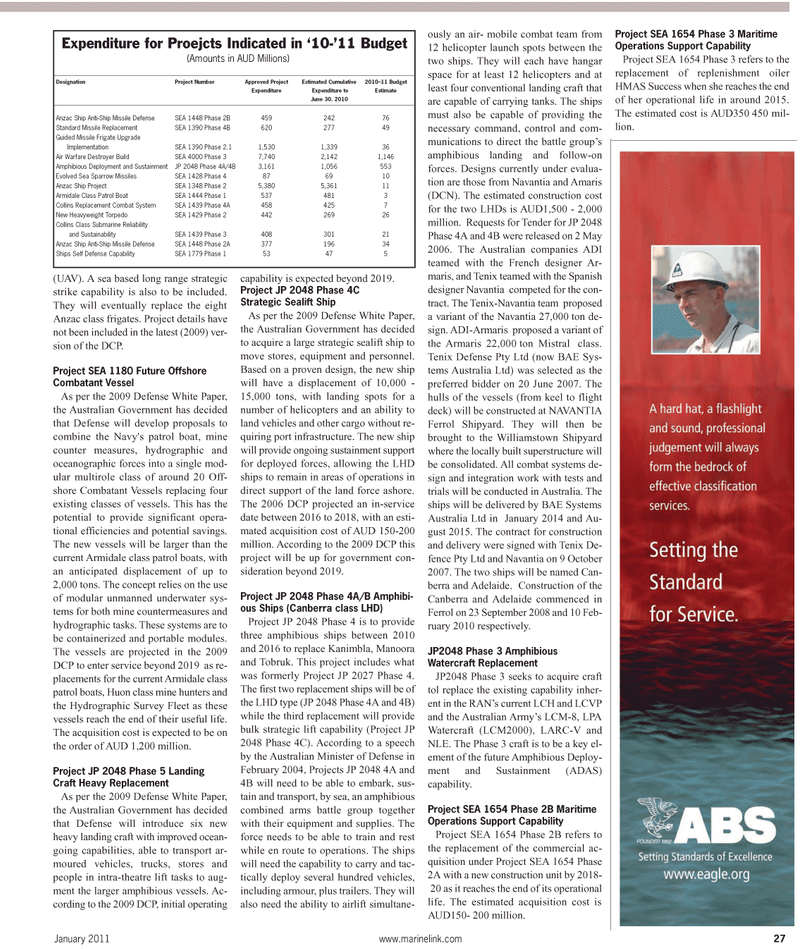
Page 27: of Maritime Reporter Magazine (January 2011)
International Naval Technology
Read this page in Pdf, Flash or Html5 edition of January 2011 Maritime Reporter Magazine
(UAV). A sea based long range strategic strike capability is also to be included.
They will eventually replace the eight
Anzac class frigates. Project details have not been included in the latest (2009) ver- sion of the DCP.
Project SEA 1180 Future Offshore
Combatant Vessel
As per the 2009 Defense White Paper, the Australian Government has decided that Defense will develop proposals to combine the Navy's patrol boat, mine counter measures, hydrographic and oceanographic forces into a single mod- ular multirole class of around 20 Off- shore Combatant Vessels replacing four existing classes of vessels. This has the potential to provide significant opera- tional efficiencies and potential savings.
The new vessels will be larger than the current Armidale class patrol boats, with an anticipated displacement of up to 2,000 tons. The concept relies on the use of modular unmanned underwater sys- tems for both mine countermeasures and hydrographic tasks. These systems are to be containerized and portable modules.
The vessels are projected in the 2009
DCP to enter service beyond 2019 as re- placements for the current Armidale class patrol boats, Huon class mine hunters and the Hydrographic Survey Fleet as these vessels reach the end of their useful life.
The acquisition cost is expected to be on the order of AUD 1,200 million.
Project JP 2048 Phase 5 Landing
Craft Heavy Replacement
As per the 2009 Defense White Paper, the Australian Government has decided that Defense will introduce six new heavy landing craft with improved ocean- going capabilities, able to transport ar- moured vehicles, trucks, stores and people in intra-theatre lift tasks to aug- ment the larger amphibious vessels. Ac- cording to the 2009 DCP, initial operating capability is expected beyond 2019.
Project JP 2048 Phase 4C
Strategic Sealift Ship
As per the 2009 Defense White Paper, the Australian Government has decided to acquire a large strategic sealift ship to move stores, equipment and personnel.
Based on a proven design, the new ship will have a displacement of 10,000 - 15,000 tons, with landing spots for a number of helicopters and an ability to land vehicles and other cargo without re- quiring port infrastructure. The new ship will provide ongoing sustainment support for deployed forces, allowing the LHD ships to remain in areas of operations in direct support of the land force ashore.
The 2006 DCP projected an in-service date between 2016 to 2018, with an esti- mated acquisition cost of AUD 150-200 million. According to the 2009 DCP this project will be up for government con- sideration beyond 2019.
Project JP 2048 Phase 4A/B Amphibi- ous Ships (Canberra class LHD)
Project JP 2048 Phase 4 is to provide three amphibious ships between 2010 and 2016 to replace Kanimbla, Manoora and Tobruk. This project includes what was formerly Project JP 2027 Phase 4.
The first two replacement ships will be of the LHD type (JP 2048 Phase 4A and 4B) while the third replacement will provide bulk strategic lift capability (Project JP 2048 Phase 4C). According to a speech by the Australian Minister of Defense in
February 2004, Projects JP 2048 4A and 4B will need to be able to embark, sus- tain and transport, by sea, an amphibious combined arms battle group together with their equipment and supplies. The force needs to be able to train and rest while en route to operations. The ships will need the capability to carry and tac- tically deploy several hundred vehicles, including armour, plus trailers. They will also need the ability to airlift simultane- ously an air- mobile combat team from 12 helicopter launch spots between the two ships. They will each have hangar space for at least 12 helicopters and at least four conventional landing craft that are capable of carrying tanks. The ships must also be capable of providing the necessary command, control and com- munications to direct the battle group’s amphibious landing and follow-on forces. Designs currently under evalua- tion are those from Navantia and Amaris (DCN). The estimated construction cost for the two LHDs is AUD1,500 - 2,000 million. Requests for Tender for JP 2048
Phase 4A and 4B were released on 2 May 2006. The Australian companies ADI teamed with the French designer Ar- maris, and Tenix teamed with the Spanish designer Navantia competed for the con- tract. The Tenix-Navantia team proposed a variant of the Navantia 27,000 ton de- sign. ADI-Armaris proposed a variant of the Armaris 22,000 ton Mistral class.
Tenix Defense Pty Ltd (now BAE Sys- tems Australia Ltd) was selected as the preferred bidder on 20 June 2007. The hulls of the vessels (from keel to flight deck) will be constructed at NAVANTIA
Ferrol Shipyard. They will then be brought to the Williamstown Shipyard where the locally built superstructure will be consolidated. All combat systems de- sign and integration work with tests and trials will be conducted in Australia. The ships will be delivered by BAE Systems
Australia Ltd in January 2014 and Au- gust 2015. The contract for construction and delivery were signed with Tenix De- fence Pty Ltd and Navantia on 9 October 2007. The two ships will be named Can- berra and Adelaide. Construction of the
Canberra and Adelaide commenced in
Ferrol on 23 September 2008 and 10 Feb- ruary 2010 respectively.
JP2048 Phase 3 Amphibious
Watercraft Replacement
JP2048 Phase 3 seeks to acquire craft tol replace the existing capability inher- ent in the RAN’s current LCH and LCVP and the Australian Army’s LCM-8, LPA
Watercraft (LCM2000), LARC-V and
NLE. The Phase 3 craft is to be a key el- ement of the future Amphibious Deploy- ment and Sustainment (ADAS) capability.
Project SEA 1654 Phase 2B Maritime
Operations Support Capability
Project SEA 1654 Phase 2B refers to the replacement of the commercial ac- quisition under Project SEA 1654 Phase 2A with a new construction unit by 2018- 20 as it reaches the end of its operational life. The estimated acquisition cost is
AUD150- 200 million.
Project SEA 1654 Phase 3 Maritime
Operations Support Capability
Project SEA 1654 Phase 3 refers to the replacement of replenishment oiler
HMAS Success when she reaches the end of her operational life in around 2015.
The estimated cost is AUD350 450 mil- lion.
January 2011 www.marinelink.com 27
Expenditure for Proejcts Indicated in ‘10-’11 Budget (Amounts in AUD Millions)
Designation Project Number Approved Project Estimated Cumulative 2010�a11 Budget
Expenditure Expenditure to Estimate
June 30. 2010
Anzac Ship Anti-Ship Missile Defense SEA 1448 Phase 2B 459 242 76
Standard Missile Replacement SEA 1390 Phase 4B 620 277 49
Guided Missile Frigate Upgrade
Implementation SEA 1390 Phase 2.1 1,530 1,339 36
Air Warfare Destroyer Build SEA 4000 Phase 3 7,740 2,142 1,146
Amphibious Deployment and Sustainment JP 2048 Phase 4A/4B 3,161 1,056 553
Evolved Sea Sparrow Missiles SEA 1428 Phase 4 87 69 10
Anzac Ship Project SEA 1348 Phase 2 5,380 5,361 11
Armidale Class Patrol Boat SEA 1444 Phase 1 537 481 3
Collins Replacement Combat System SEA 1439 Phase 4A 458 425 7
New Heavyweight Torpedo SEA 1429 Phase 2 442 269 26
Collins Class Submarine Reliability and Sustainability SEA 1439 Phase 3 408 301 21
Anzac Ship Anti-Ship Missile Defense SEA 1448 Phase 2A 377 196 34
Ships Self Defense Capability SEA 1779 Phase 1 53 47 5

 26
26

 28
28
